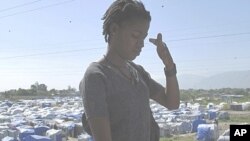United Nations and international aid agencies say significant progress has been made in helping Haitians recover from the earthquake that devastated their country almost one year ago. But, they acknowledge humanitarian operations fall far short of what is needed to rebuild Haitian society.
Last year’s earthquake killed about one-quarter of a million people. The outpouring of International aid to the relief effort was large and immediate.
The International Federation of Red Cross and Red Crescent Societies alone received more than $1 billion in donations. Red Cross spokesman, Paul Conneally, says this has been the largest response ever received by the organization in its entire history, including the tsunami operations in Asia several years ago.
Despite all the achievements, he says the goal of reconstructing destroyed cities and rebuilding shattered lives and livelihoods remains a very long-term one.
“Nobody can pretend that this has been a hugely successful humanitarian response,” Conneally said. “If anything, it demonstrates the limitations of humanitarian action. There are massive developmental challenges. The Red Cross, for instance is explaining itself in playing metropolitan roles, which it is not set up for in terms of provision of water and sanitation to the Metropolitan area of Port-au-Prince.…We are still basically in emergency phase, obviously looking at recovery as well. We are very much involved in recovery and looking at the long term. But, it is still basically emergency action in many, many areas.”
Along with earthquake recovery, the Red Cross and other international agencies have had to deal with additional disasters. They have had to rescue people from hurricanes and severe flooding. And, they continue to work to stem the debilitating affects of a severe cholera outbreak. Latest figures from the Haitian Ministry of Health show nearly 3,500 people have died of cholera, including 210 children below the age of five. So far, it reports more than 157,000 people have been infected with the disease.
A spokeswoman for the U.N. Children’s Fund, Marixie Mercado, agrees the international responses to humanitarian emergencies are never perfect and Haiti is no exception. And yet, she says when aid agencies work together they do save lives and improve the condition of people victimized by disaster.
“In the cholera response, for example, the case fatality rates in the camps are lower than they are elsewhere,” said Mercado. “And, I think that does have to do with having better access to sanitation, safe water and health services.”
The humanitarian crisis in Haiti is far from over. Aid agencies say they are more united than ever in their determination to improve the lives of those who have survived the earthquake.
They say they are committed to, what they call, building back better. They say they will provide the shelter, the food, the jobs, the safe water and sanitation, the health and education needed for rehabilitation.
UN: Rebuilding Earthquake-Shattered Haiti Will Take Years
- By Lisa Schlein




